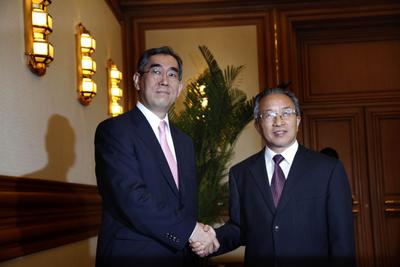Japan is facing numerous challenges, but the country may yet emerge stronger for its challenges. As world history amply demonstrates, crisis can breed opportunity. At a recent dinner in Tokyo, senior Japanese business leaders, saw the crisis as an opportunity to move closer to China.
Supply chain disruption, caused by sudden declines in parts supply and production centre productivity is a pressing challenge. One executive noted that disruptions to his supply chain caused by the triple disaster had left him with little choice but to expand his business and export base in China. He would also urge his parts suppliers to move to China, he added, as some of their factories had been devastated. Another chimed in: ‘That’s right. The uncertainty of the energy supply is really the drawback here. You have to keep your production steady to stay in business, and expanding your business in China is a way to do so — whether you like it or not.’ Honda and Mitsubishi Motors have been forced to cut down their China operations because of the abruptly reduced supply of semi-conductor parts from the Tohoku area.
Both countries stand to gain from this new approach to international business. Chinese markets and factories are increasingly important in the global operations of Japanese businesses, particularly as they seek to diversify parts supply-chains and, in some cases, transfer these operations to China. China, meanwhile, is anxious to acquire Japanese manufacturing technology. China’s recovery demands could well be a catalyst for serious change in Sino-Japanese economic relations. At the very least, as Guo Dinping, Deputy Director of the Institute of International Studies at Fudan University, puts it, Japan’s recovery demands will be a ‘booster to China’.
This is the moment of truth as to whether or not Japan will remain a global power. While the US-Japan alliance will continue to be central to peace and security in the Asia-Pacific, negating a more stable and trustworthy Sino-Japanese relationship will be essential to rebuilding. Japan must also be willing and able to build strategic economic ties with emerging markets. Future decisions on budgeting for official development assistance will represent a significant test of this resolve.
Strong leadership will be needed to translate crisis into opportunity, and Japan’s current leadership may not be able to deliver. Without this kind of leadership, the disaster may be a catalyst for a parochial take on Japan’s future, that would waste current opportunities and marginalise Japan on the global scene.
The road to deepening mutual trust between Japan and China will not be smooth. China responded quickly following the triple disaster in Japan. Although its motives are mixed — commercial ‘booster’ effects, a sense of vulnerability to ‘Jasmine revolution’ and inflation, and the impressive demonstration of US-Japan joint operations, China is clearly signalling for a deepening of the Sino-Japanese relationship. Despite this, new mergers and acquisitions incentives between the two countries could engender a popular anti-China backlash in Japan. The Chinese September ban on rare earth exports to Japan has also caused some resentment. Top business executives are careful not to mention the ‘C’ word (China) in describing plans to transfer production and research and development to China. One executive at the dinner cautioned they should not broadcast their thinking. ‘People will be upset to hear you are abandoning them when they are in deep trouble.’
Reorienting the relationship and building closer ties will stabilise the region, and Japanese initiatives into civilian nuclear safety and green energy may help China respond to urgent domestic challenges.
Surveying the course of history, Japan’s new tilt to China will seem not dissimilar to the trajectory of its recovery and revitalisation following the Pacific war. Then, Japan’s new economic ties with the US constituted the spark to jump-start Japan’s recovery and revitalisation. But the success of the manoeuvre hinged critically on the ability to develop political stability and mutual trust between the US and Japan. This time around, the spark must come from the China engine.
Yoichi Funabashi is the former editor-in-chief of the Asahi Shimbun.

